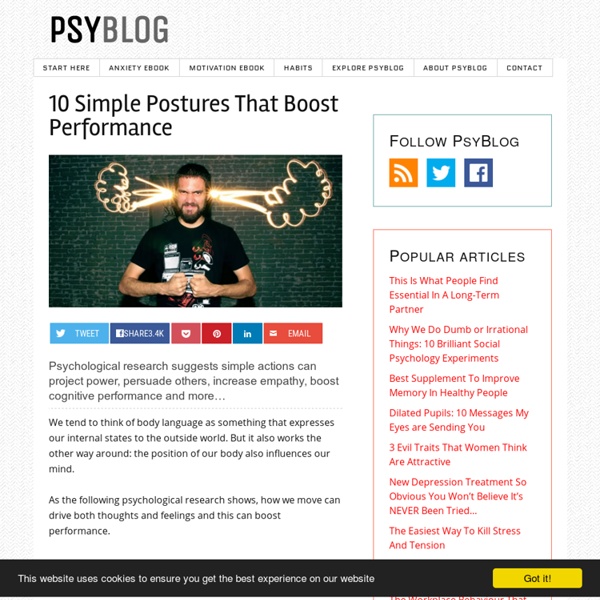7 Body Language Tricks To Make Anyone Instantly Like You
There’s no question that body language is important. And, according to Leil Lowndes in her book “How To Talk To Anyone,” you can capture — and hold — anyone’s attention without even saying a word. We’ve selected the best body language techniques from the book and shared them below: The Flooding Smile
Learned Helplessness
The Misconception: If you are in a bad situation, you will do whatever you can do to escape it. The Truth: If you feel like you aren’t in control of your destiny, you will give up and accept whatever situation you are in. In 1965, a scientist named Martin Seligman started shocking dogs. He was trying to expand on the research of Pavlov – the guy who could make dogs salivate when they heard a bell ring.
The What-The-Hell Effect
What pizza and cookies can teach us about goal-setting. Goal-setting can be a handy way of improving performance, except when we fall foul of a nasty little side-effect. Take dieting as an example.
List of cognitive biases
Systematic patterns of deviation from norm or rationality in judgment Cognitive biases are systematic patterns of deviation from norm and/or rationality in judgment. They are often studied in psychology, sociology and behavioral economics.[1] Although the reality of most of these biases is confirmed by reproducible research,[2][3] there are often controversies about how to classify these biases or how to explain them.[4] Several theoretical causes are known for some cognitive biases, which provides a classification of biases by their common generative mechanism (such as noisy information-processing[5]). Gerd Gigerenzer has criticized the framing of cognitive biases as errors in judgment, and favors interpreting them as arising from rational deviations from logical thought.[6]
5 Benefits of Meditation I Didn't Expect (and How They Can Make You Successful)
I’m not a meditation teacher. I’m not even a very enthusiastic meditator. I’ve averaged about 20 minutes once a week for the past couple of years, and any serious meditator will tell you that’s not enough to really benefit you. Except it seems like it is, because I’ve noticed some benefits that I can’t attribute to anything else. I’m sure I’d get far more benefit if I meditated more regularly (I’m experimenting quietly with doing that).
How to Get Out of That Funk
Do you ever find yourself in a funk? I sure do. Once I was on the road, preparing to deliver a speech. I love speaking, but I was experiencing an unusual amount of distraction and self-doubt. Courtesy of iStock/lzf
Color Psychology
by David Johnson Like death and taxes, there is no escaping color. It is ubiquitous. Yet what does it all mean? Why are people more relaxed in green rooms?
Stanley Milgram: Obedience to Authority Or Just Conformity?
What psychological experiment could be so powerful that simply taking part might change your view of yourself and human nature? What experimental procedure could provoke some people to profuse sweating and trembling, leaving 10% extremely upset, while others broke into unexplained hysterical laughter? What finding could be so powerful that it sent many psychologists into frenzied rebuttals?
What Does Your Body Language Say About You? How To Read Signs and Recognize Gestures - Jinxi Boo - Jinxi Boo
Art by LaetitziaAs we all know, communication is essential in society. Advancements in technology have transformed the way that we correspond with others in the modern world. Because of the constant buzz in our technological world, it's easy to forget how important communicating face-to-face is.
» you’re already perfect
‘Be Content with what you have; rejoice in the way things are. When you realize there is nothing lacking, the whole world belongs to you.’ ~Lao Tzu Post written by Leo Babauta. Follow me on twitter . A lot of people come to Zen Habits (and read other personal development blogs and books) because they want to improve something about themselves.
5 Nonverbal Blunders To Avoid In Your Next Sales Meeting
Your nonverbal communication is between 60-93% of your total communication. It’s essential that your nonverbal communication is spot on if you want to sell something effectively, so make sure you don’t commit any of these 5 blunders! #1 Too much/too little eye contact People hold eye contact for 60-70% of the time in a normal conversation. By having eye contact you show that you’re listening and that you understand the other person.



